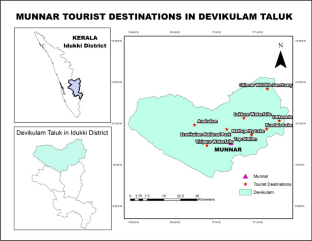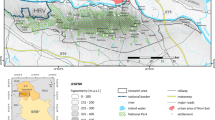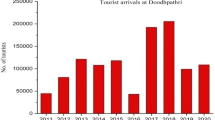Abstract
In the sphere of mass tourism, ecotourism offers a method for promoting conservation and sustainability. Ecotourism differs from mass tourism as it includes recreational activities focusing on environmental conservation, education, and cultural experiences. Previous studies have explored tourists' awareness and attitudes towards ecotourism in various destinations but considering the unique cultural and geographical context of the destination, highlights the need for a destination-specific scale to inform sustainable decision-making. Tourist behavior and attitudes are critical to the tourism destination's long-term viability. This research aimed to study the attitude and awareness levels of tourists in Munnar towards environmentally sustainable tourism. Primary data were collected from the tourists adopting convenient sampling method. The survey results demonstrate that people have a positive attitude and are aware of the importance of environmentally friendly tourism. The findings also show that tourist awareness and attitudes toward Munnar's ecotourism and conservation are highly and strongly associated. Studying traveler understanding and attitudes toward sustainable tourism would be highly beneficial to local governments and ecotourism destination operators in responding to environmentally sustainable tourism and adapting to the need for better tourism practices.

Similar content being viewed by others
Data availability
Due to confidentiality agreements, questionnaire feedback data sets cannot be made openly available. Supporting data like questionnaire used in the study can only be made available to bona fide researchers subject to a non-disclosure agreement.
References
Ballantyne, R., Packer, J., & Sutherland, L. A. (2011). Visitors’ memories of wildlife tourism: Implications for the design of powerful interpretive experiences. Tourism Management, 32(4), 770–779. https://doi.org/10.1016/j.tourman.2010.06.012
Baloch, Q. B., Shah, S. N., Iqbal, N., Sheeraz, M., Asadullah, M., Mahar, S., & Khan, A. U. (2022). Impact of tourism development upon environmental sustainability: A suggested framework for sustainable ecotourism. Environmental Science and Pollution Research, 1–14.
Bhalla, P., & Bhattacharya, P. (2019). Visitors’ satisfaction from ecotourism in the protected area of the Indian Himalayan Region using importance–performance analysis. Journal of Global Scholars of Marketing Science, 29(2), 162–179.
Brown, K., Turner, R. K., Hameed, H., & Bateman, I. A. N. (1997). Environmental carrying capacity and tourism development in the Maldives and Nepal. Environmental Conservation, 24(4), 316–325.
Burns, R. C., Arnberger, A., & Ruschkowski, E. V. (2010). Social carrying capacity challenges in parks, forests, and protected areas. International Journal of Sociology, 40(3), 30–50. https://doi.org/10.2753/IJS0020-7659400302
Butler, R. (1991). Tourism, environment, and sustainable development. Environmental Conservation, 18, 201–2019. https://doi.org/10.1017/S0376892900022104
Carvache-Franco, M., Segarra-Oña, M., & Carrascosa López, C. (2019). Motivations analysis in ecotourism through an empirical application: Segmentation, characteristics and motivations of the consumer. Geo Journal of Tourism and Geosites, 24(1), 60–73.
Chandran, C., & Bhattacharya, P. (2021). Perception of visitors on ecotourism environmental impact: A study of Munnar, Kerala, India. World Journal of Environmental Biosciences, 10(2), 1–8. https://doi.org/10.51847/abGiA4pZsB
Chin, C. L., Moore, S. A., Wallington, T. J., & Dowling, R. K. (2000). Ecotourism in Bako National Park, Borneo: Visitors’ perspectives on environmental impacts and their management. Journal of Sustainable Tourism, 8(1), 20–35.
Choi, H. C., & Murray, I. (2010). Resident attitudes toward sustainable community tourism. Journal of Sustainable Tourism, 18(4), 575–594. https://doi.org/10.1080/09669580903524852
Choi, H. C., & Sirakaya, E. (2006). Sustainability indicators for managing community tourism. Tourism Management, 27(6), 1274–1289.
Cidalia Tojeiro, M. (2011). The ecotourism sustainable strategy: engagement and overcoming. Journal of Coastal Research, 61(10061), 221–225.
Das, M., & Chatterjee, B. (2015). Ecotourism: A panacea or a predicament? Tourism Management Perspectives, 14, 3–16. https://doi.org/10.1016/j.tmp.2015.01.002
Deng, J., & Li, J. (2015). Self-identification of ecotourists. Journal of Sustainable Tourism, 23(2), 255–279. https://doi.org/10.1080/09669582.2014.934374
Dickson, I. M., Butchart, S. H. M., Dauncey, V., Hughes, J., Jefferson, R., Merriman, J. C., Munroe, R., Pearce-Higgins, J. P., Stephenson, P. J., Sutherland, W. J., Thomas, D. H. L., & Trevelyan, R. (2017). PRISM—Toolkit for evaluating the outcomes and impacts of small/medium-sized conservation projects. Version 1. www.conservationevaluation.org
Dolnicar, S., & Leisch, F. (2008). Selective marketing for environmentally sustainable tourism. Tourism Management, 29(4), 672–680. https://doi.org/10.1016/j.tourman.2007.07.010
Fan, X., Huang, J., & Cheng, L. (2016). The formation mechanism of residents’ environmental friendly behavior in ecotourism areas: A case study of Dongjiang Lake, a national scenic spot. Economic Geography, 36, 177–182.
Gössling, S., Scott, D., Hall, C. M., Ceron, J.-P., & Dubois, G. (2012). Consumer behaviour and demand response of tourists to climate change. Annals of Tourism Research, 39(1), 36–58. https://doi.org/10.1016/j.annals.2011.11.002
Hall, M. (2010). Changing paradigms and global change: From sustainable to steady-state tourism. Tourism Recreation Research, 35(2), 131–143. https://doi.org/10.1080/02508281.2010.11081629
Hughes, M., & Morrison-Saunders, A. (2003). Visitor attitudes toward a modified natural attraction. Society and Natural Resources, 16(3), 191–203.
Husted, B. W., Russo, M. V., Meza, C. E. B., & Tilleman, S. G. (2014). An exploratory study of environmental attitudes and the willingness to pay for environmental certification in Mexico. Journal of Business Research, 67(5), 891–899. https://doi.org/10.1016/j.jbusres.2013.07.008
Hvenegaard, G. T. (2002). Using tourist typologies for ecotourism research. Journal of Ecotourism, 1(1), 7–18. https://doi.org/10.1080/14724040208668109
John, E. (2020). Do tourists behave in a sustainable manner at destinations? Empirical evidence from Munnar. Materials Today: Proceedings, 33, 4866–4875.
Jones, N., Panagiotidou, K., Spilanis, I., Evangelinos, K. I., & Dimitrakopoulos, P. G. (2011). Visitor’s perceptions on the management of an important nesting site for loggerhead sea turtle (Caretta Caretta L.): The case of Rethymno coastal area in Greece. Ocean and Coastal Management, 54, 577–584.
Junus, S. Z., Hambali, K. A., Iman, A. H. M., Abas, M. A., & Hassin, N. H. (2020). Visitor’s perception and attitude toward the ecotourism resources at Taman Negara Kuala Koh, Kelantan. IOP Conference Series: Earth and Environmental Science, 549, 012088.
Kaffashi, S., Radam, A., Shamsudin, M. N., Yacob, M. R., & Nordin, N. H. (2015). Ecological conservation, ecotourism, and sustainable management: The case of Penang National Park. Forests, 6, 2345–2370.
Kempiak, J., Hollywood, L., Bolan, P., & McMahon-Beattie, U. (2017). The heritage tourist: An understanding of the visitor experience at heritage attractions. International Journal of Heritage Studies, 23(4), 375–392. https://doi.org/10.1080/13527258.2016.1277776
Kim, A. K., & Weiler, B. (2013). Visitors’ attitudes towards responsible fossil collecting behaviour: An environmental attitude-based segmentation approach. Tourism Management, 36, 602–612.
Kumar, S., & Chong, I. (2018). Correlation analysis to identify the effective data in machine learning: prediction of depressive disorder and emotion states. International Journal of Environmental Research and Public Health, 15(12), 2907. https://doi.org/10.3390/ijerph15122907
Lee, T. H., & Jan, F. H. (2019). Can community-based tourism contribute to sustainable development? Evidence from residents’ perceptions of the sustainability. Tourism Management, 70, 368–380. https://doi.org/10.1016/j.tourman.2018.09.003
Lian Chan, J. K., & Baum, T. (2007). Ecotourists’ perception of ecotourism experience in lower Kinabatangan, Sabah. Malaysia. Journal of Sustainable Tourism, 15(5), 574–590.
Lim, C., & McAleer, M. (2005). Ecologically sustainable tourism management. Environmental Modelling and Software, 20(11), 1431–1438.
Liu, C. H., Tzeng, G. H., Lee, M. H., & Lee, P. Y. (2013). Improving metro–airport connection service for tourism development: Using hybrid MCDM models. Tourism Management Perspectives, 6, 95–107. https://doi.org/10.1016/j.tmp.2012.09.004
Medeiros, H. M. N., Guerreiro, Q. L. D. M., Vieira, T. A., Silva, S. M. S. D., Renda, A. I. D. S. A., & Oliveira-Junior, J. M. B. (2021). Alternative tourism and environmental impacts: Perception of residents of an extractive reserve in the Brazilian Amazonia. Sustainability, 13, 2076.
Mihanyar, P., Aminudin, N., & Rahman, S. A. (2014). The influence of sustainable tourism awareness and environmental sustainability dimensions on behavioural intentions among domestic tourists in developing countries. In Conference: 7th tourism outlook conference at: Dambulla-Kandalama, Sri Lanka.
Miller, G., Rathouse, K., Scarles, C., Holmes, K., & Tribe, J. (2010). Public understanding of sustainable. Annals of Tourism Research, 37, 627–645. https://doi.org/10.1016/j.annals.2009.12.002
Neto, F. (1990). Sustainable tourism, environmental protection and natural resource management: Paradise on Earth? Growth, 1999, 2000.
Oviedo-García, M. Á., Castellanos-Verdugo, M., Vega-Vázquez, M., & Orgaz-Agüera, F. (2017). The Mediating roles of the overall perceived value of the ecotourism site and attitudes towards ecotourism in sustainability through the key relationship ecotourism knowledge-ecotourist Satisfaction. International Journal of Tourism Research, 19(2), 203–213.
Perkins, H., & Grace, D. A. (2009). Ecotourism: Supply of nature or tourist demand? Journal of Ecotourism, 8(3), 223–236. https://doi.org/10.1080/14724040802534992
Pickering, C. M. (2010). Ten factors that affect the severity of environmental impacts of visitors in protected areas. Ambio, 39, 10–11.
Pigram, J. J. (1990). Sustainable tourism-policy considerations. Journal of Tourism Studies, 1(2), 2–9.
Poudel, S., & Nyaupane, G. P. (2017). Understanding environmentally responsible behaviour of ecotourists: The reasoned action approach. Tourism Planning and Development, 14(3), 337–352. https://doi.org/10.1080/21568316.2016.1221851
Rej, S., Bandyopadhyay, A., Murshed, M., Mahmood, H., & Razzaq, A. (2022). Pathways to decarbonization in India: the role of environmentally friendly tourism development. Environmental Science and Pollution Research, 1–22.
Ren, J., Su, K., Chang, Y., & Wen, Y. (2021). Formation of environmentally friendly tourist behaviors in ecotourism destinations in China. Forests, 12, 424. https://doi.org/10.3390/f12040424
Rivera, J. P. R., Gutierrez, E. L. M., & Rivera, J. P. R. (2018). A framework toward sustainable ecotourism value chain in the Philippines. Journal of Quality Assurance in Hospitality and Tourism, Routledge, 00(00), 1–20.
Rozelee, S., Rahman, S., & Omar, S. I. (2015). Tourists’ perceptions on environmental impact attributes of mabul Island and their relationship with education factor. Environment Science Tourism Environment Society of Management Science, 15, 146–152.
Rutty, M., Gossling, S., Scott, D., Hall, C.M. (2015). The global effects and impacts of tourism from: The Routledge handbook of tourism and sustainability Routledge.
Satyanarayana, B., Bhanderi, P., Debry, M., Maniatis, D., Foré, F., Badgie, D., Jammeh, K., Vanwing, T., Farcy, C., Koedam, N., & Dahdouu-Guebas, F. (2012). A socio-ecological assessment aiming at improved forest resource management and sustainable ecotourism development in the mangroves of Tanbi Wetland National Park, The Gambia, West Africa. Ambio, 41(5), 513–526. https://doi.org/10.1007/s13280-012-0248-7
Scheyvens, R. (1999). Ecotourism and the empowerment of local communities. Tourism Management, 20(2), 245–249. https://doi.org/10.1016/S0261-5177(98)00069-7
Seow, T. W., Abas, M. A., Mohamed, S., Goh, K. C., & Zainal, R. (2017). Good governance in national solid waste management policy implementation: A case study Malaysia. AIP Conference Proceeding, 1891, 020128.
Sharpley, R. (2021). On the need for sustainable tourism consumption. Tourist Studies, 21(1), 96–107.
Sharpley, R., & Duffy, R. (2006). Ecotourism: A consumption perspective. Journal of Ecotourism, 5(1–2), 7–22. https://doi.org/10.1080/14724040608668444
Stefănica, M., & Butnaru, G. I. (2015). Research on tourists’ perception of the relationship between tourism and environment. Procedia Economics and Finance, 20, 595–600.
Struhsaker, T. T., Struhsaker, P. J., & Siex, K. S. (2005). Conserving Africa’s rain forests: Problems in protected areas and possible solutions. Biological Conservation, 123(1), 45–54.
Suckall, N., Fraser, E. D. G., Cooper, T., & Quinn, C. (2009). Visitor perceptions of rural landscapes: A case study in the Peak District National Park, England. Journal of Environmental Management, 90, 1195–1203.
Sun, R. H., & Gao, J. (2012). A literature review on Chinese ecotourism study proceeding. Advanced Materials Research, 573–574, 366–369. https://doi.org/10.4028/www.scientific.net/AMR.573-574.366
Swarbrooke, J. (2002). The development and management of visitor attractions (2nd ed.). Butterworth-Heinemann.
The International Ecotourism Society (TIES). (2015). Ecotourism. The International Ecotourism Society. www.ecotourism.org
Togridou, A., Hovardas, T., & Pantis, J. D. (2006). Determinants of visitors’ willingness to pay for the National Marine Park of Zakynthos, Greece. Ecological Economics, 60, 308–319.
Unathi Sonwabile, K., Tembi, M., & T. (2018). Sustainable development goals and socio-economic development through tourism in central Africa: Myth or reality? GeoJournal of Tourism and Geosites, 23(3), 780.
Venugopalan, T., & Kumar, D. (2017). Sustainable development through sustainable tourism in India-A case study of Kerala tourism. Asian Journal of Research in Business Economics and Management, 7(12), 10–27.
Villanthenkodath, M. A., Mahalik, M. K., & Arafath, K. M. I. Y. (2022). The role of tourism development in India's environmental degradation: evidence from ARDL and wavelet coherence approaches. Management of Environmental Quality: An International Journal (ahead-of-print).
Wackernagel, M., & Ress, M. (1996). Our ecological footprint: Reducing human impact on the earth. New Society Publishers.
Wang, X., Yu, Y., Zhu, Z., & Zheng, J. (2022). Visiting intentions toward theme parks: Do short video content and tourists’ perceived playfulness on TikTok matter? Sustainability, 14(19), 12206.
Weaver, D. B. (2005). Comprehensive and minimalist dimensions of ecotourism. Annals of Tourism Research, 32(2), 439–455. https://doi.org/10.1016/j.annals.2004.08.003
Wu, Z., Lai, I. K. W., & Tang, H. (2021). Evaluating the sustainability issues in tourism development: An adverse-impact and serious-level analysis. SAGE Open, 11(4), 21582440211050384.
Acknowledgements
We want to express great appreciation to Dr. Pratyansha Singh (Ph.D. Environment Management, GGSIP University, Delhi) and Mr. Apoorv Kalra (B. Tech. Aerospace, SRM University, Chennai) for valuable and constructive suggestions in the statistical analysis of the study. We would also like to show our gratitude to the Kerala Forest Department for their support throughout this research.
Funding
We want to thank Guru Gobind Singh Indraprastha University for providing Short Term Research Fund (GGSIPU/DRC/Ph.D./Adm./2016/1904) supporting this research work.
Author information
Authors and Affiliations
Corresponding author
Ethics declarations
Conflict of interest
No potential conflict of interest was reported by the author(s).
Ethics statement
Taking the American Association of Public Opinion Research (AAPOR) code as a guide, Ethics approval was not sought as all participants provided written informed consent prior to enrollment in the study and participation was voluntary. In addition, the respondent’s anonymity and confidentiality were kept.
Additional information
Publisher's Note
Springer Nature remains neutral with regard to jurisdictional claims in published maps and institutional affiliations.
Rights and permissions
Springer Nature or its licensor (e.g. a society or other partner) holds exclusive rights to this article under a publishing agreement with the author(s) or other rightsholder(s); author self-archiving of the accepted manuscript version of this article is solely governed by the terms of such publishing agreement and applicable law.
About this article
Cite this article
Chandran, C., Bhattacharya, P. Tourist's level of awareness and attitude about destination ecotourism development: a case study of Munnar, Kerala, India. Environ Dev Sustain (2023). https://doi.org/10.1007/s10668-023-03745-5
Received:
Accepted:
Published:
DOI: https://doi.org/10.1007/s10668-023-03745-5




